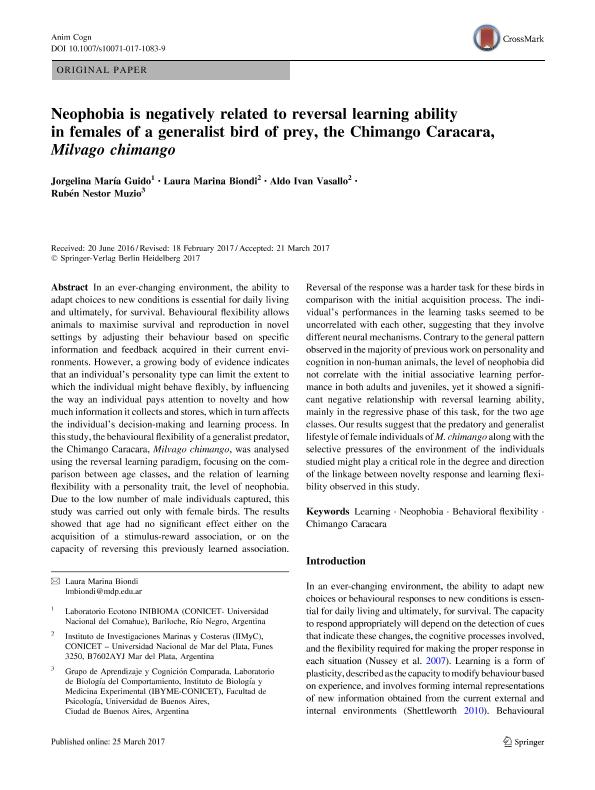Artículo
Neophobia is negatively related to reversal learning ability in females of a generalist bird of prey, the Chimango Caracara, Milvago chimango
Fecha de publicación:
03/2017
Editorial:
Springer
Revista:
Animal Cognition
ISSN:
1435-9448
e-ISSN:
1435-9456
Idioma:
Inglés
Tipo de recurso:
Artículo publicado
Clasificación temática:
Resumen
In an ever-changing environment, the ability to adapt choices to new conditions is essential for daily living and ultimately, for survival. Behavioural flexibility allows animals to maximise survival and reproduction in novel settings by adjusting their behaviour based on specific information and feedback acquired in their current environments. However, a growing body of evidence indicates that an individual’s personality type can limit the extent to which the individual might behave flexibly, by influencing the way an individual pays attention to novelty and how much information it collects and stores, which in turn affects the individual’s decision-making and learning process. In this study, the behavioural flexibility of a generalist predator, the Chimango Caracara, Milvago chimango, was analysed using the reversal learning paradigm, focusing on the comparison between age classes, and the relation of learning flexibility with a personality trait, the level of neophobia. Due to the low number of male individuals captured, this study was carried out only with female birds. The results showed that age had no significant effect either on the acquisition of a stimulus-reward association, or on the capacity of reversing this previously learned association. Reversal of the response was a harder task for these birds in comparison with the initial acquisition process. The individual’s performances in the learning tasks seemed to be uncorrelated with each other, suggesting that they involve different neural mechanisms. Contrary to the general pattern observed in the majority of previous work on personality and cognition in non-human animals, the level of neophobia did not correlate with the initial associative learning performance in both adults and juveniles, yet it showed a significant negative relationship with reversal learning ability, mainly in the regressive phase of this task, for the two age classes. Our results suggest that the predatory and generalist lifestyle of female individuals of M. chimango along with the selective pressures of the environment of the individuals studied might play a critical role in the degree and direction of the linkage between novelty response and learning flexibility observed in this study.
Palabras clave:
Learning
,
Neophobia
,
Behavioral Flexibility
,
Chimango Caracara
Archivos asociados
Licencia
Identificadores
Colecciones
Articulos(IBYME)
Articulos de INST.DE BIOLOGIA Y MEDICINA EXPERIMENTAL (I)
Articulos de INST.DE BIOLOGIA Y MEDICINA EXPERIMENTAL (I)
Articulos(IIMYC)
Articulos de INSTITUTO DE INVESTIGACIONES MARINAS Y COSTERAS
Articulos de INSTITUTO DE INVESTIGACIONES MARINAS Y COSTERAS
Articulos(INIBIOMA)
Articulos de INST. DE INVEST.EN BIODIVERSIDAD Y MEDIOAMBIENTE
Articulos de INST. DE INVEST.EN BIODIVERSIDAD Y MEDIOAMBIENTE
Citación
Guido, Jorgelina María; Biondi, Laura Marina; Vassallo, Aldo Iván; Muzio, Ruben Nestor; Neophobia is negatively related to reversal learning ability in females of a generalist bird of prey, the Chimango Caracara, Milvago chimango; Springer; Animal Cognition; 20; 4; 3-2017; 591-602
Compartir
Altmétricas




